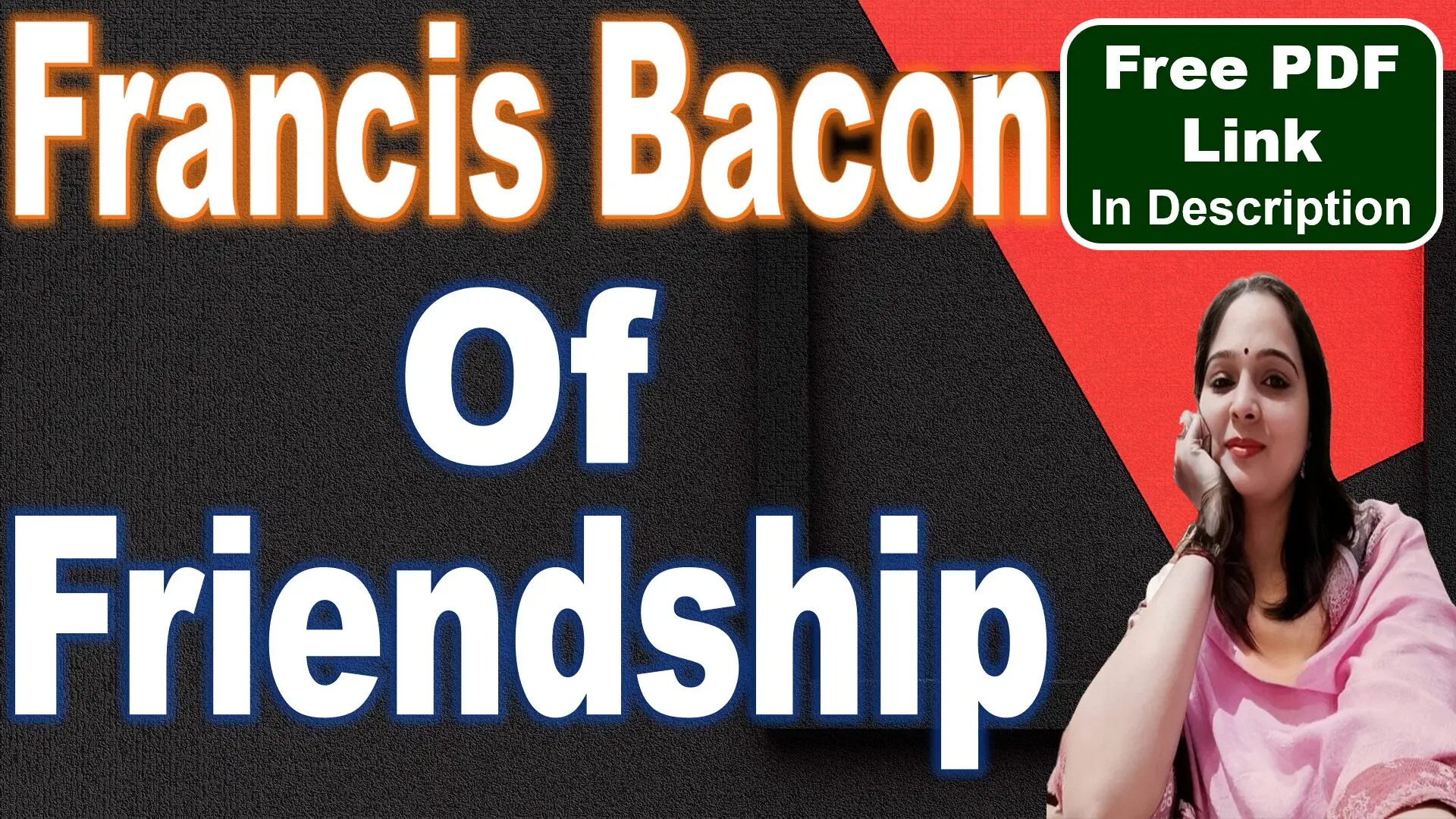
Of Marriage and Single Life by Francis Bacon | Of Marriage and Single Life | Francis Bacon | Francis Bacon as Essayist | Summary | Key Points | Word Meaning | Questions Answers | Critical Appreciation | Free PDF Download – Easy Literary Lesson
Of Marriage and Single Life by Francis Bacon
He that hath wife and children hath given hostages to fortune; for they are impediments to great enterprises, either of virtue or mischief. Certainly the best works, and of greatest merit for the public, have proceeded from the unmarried or childless men; which both in affection and means, have married and endowed the public. Yet it were great reason that those that have children should have greatest care of future times; unto which they know they must transmit their dearest pledges. Some there are, who though they lead a single life, yet their thoughts do end with themselves, and account future times impertinences. Nay, there are some other, that account wife and children, but as bills of charges. Nay more, there are some foolish rich covetous men that take a pride in having no children, because they may be thought so much the richer. For perhaps they have heard some talk, Such an one is a great rich man, and another except to it, Yea, but he hath a great charge of children; as if it were an abatement to his riches. But the most ordinary cause of a single life is liberty, especially in certain self-pleasing and humorous minds, which are so sensible of every restraint, as they will go near to think their girdles and garters to be bonds and shackles. Unmarried men are best friends, best masters, best servants; but not always best subjects; for they are light to run away; and almost all fugitives are of that condition. A single life doth well with churchmen; for charity will hardly water the ground where it must first fill a pool. It is indifferent for judges and magistrates; for if they be facile and corrupt, you shall have a servant five times worse than a wife. For soldiers, I find the generals commonly in their hortatives, put men in mind of their wives and children; and I think the despising of marriage amongst the Turks maketh the vulgar soldier more base. Certainly wife and children are a kind of discipline of humanity; and single men, though they may be many times more charitable, because their means are less exhaust, yet, on the other side, they are more cruel and hardhearted (good to make severe inquisitors), because their tenderness is not so oft called upon. Grave natures, led by custom, and therefore constant, are commonly loving husbands, as was said of Ulysses, vetulam suam praetulit immortalitati. Chaste women are often proud and froward, as presuming upon the merit of their chastity. It is one of the best bonds, both of chastity and obedience, in the wife, if she think her husband wise; which she will never do if she find him jealous. Wives are young men’s mistresses; companions for middle age; and old men’s nurses. So as a man may have a quarrel to marry, when he will. But yet he was reputed one of the wise men, that made answer to the question, when a man should marry, — A young man not yet, an elder man not at all. It is often seen that bad husbands have very good wives; whether it be that it raiseth the price of their husband’s kindness when it comes; or that the wives take a pride in their patience. But this never fails, if the bad husbands were of their own choosing, against their friends’ consent; for then they will be sure to make good their own folly.
Of Marriage and Single Life: YouTube Link
Of Marriage and Single Life Line by Line Analysis
1. “He that hath wife and children hath given hostages to fortune; for they are impediments to great enterprises, either of virtue or mischief.”
Bacon begins by suggesting that having a wife and children ties a man down and makes him vulnerable (“hostages to fortune”). These family obligations can hinder a man from pursuing significant endeavors, whether they are noble or wicked.
2. “Certainly the best works, and of greatest merit for the public, have proceeded from the unmarried or childless men; which both in affection and means, have married and endowed the public.”
He observes that many of the most important contributions to society have come from unmarried or childless men. These men, without personal family obligations, have devoted their resources and love to the public good.
3. “Yet it were great reason that those that have children should have greatest care of future times; unto which they know they must transmit their dearest pledges.”
However, Bacon argues that it is reasonable for people with children to be the most concerned about the future since they have a responsibility to ensure the well-being of their descendants.
4. “Some there are, who though they lead a single life, yet their thoughts do end with themselves, and account future times impertinences.”
Some single people only care about themselves and do not concern themselves with the future, considering it irrelevant.
5. “Nay, there are some other, that account wife and children, but as bills of charges.”
There are others who see a wife and children merely as financial burdens.
6. “Nay more, there are some foolish rich covetous men that take a pride in having no children, because they may be thought so much the richer.”
Some wealthy, greedy men take pride in not having children because it allows them to appear even richer.
7. “For perhaps they have heard some talk, Such an one is a great rich man, and another except to it, Yea, but he hath a great charge of children; as if it were an abatement to his riches.”
They may have heard people say that someone is wealthy, only for someone else to remark that he has many children, implying that having children diminishes his wealth.
8. “But the most ordinary cause of a single life is liberty, especially in certain self-pleasing and humorous minds, which are so sensible of every restraint, as they will go near to think their girdles and garters to be bonds and shackles.”
Bacon notes that the primary reason people remain single is the desire for personal freedom. Some people, who are particularly sensitive to any form of restraint, even view small inconveniences like wearing belts or garters as oppressive.
9. “Unmarried men are best friends, best masters, best servants; but not always best subjects; for they are light to run away; and almost all fugitives are of that condition.”
Single men make the best friends, employers, and servants because they are not tied down by family obligations. However, they are not the best citizens or subjects because they are more likely to flee from responsibility or danger, as most fugitives are single.
10. “A single life doth well with churchmen; for charity will hardly water the ground where it must first fill a pool.”
Single life is suitable for clergymen because they can focus their charity on the broader community rather than having to prioritize their families.
11. “It is indifferent for judges and magistrates; for if they be facile and corrupt, you shall have a servant five times worse than a wife.”
For judges and magistrates, being single or married doesn’t matter much. However, if they are corrupt, their servants can be much worse than any troublesome wife.
12. “For soldiers, I find the generals commonly in their hortatives, put men in mind of their wives and children; and I think the despising of marriage amongst the Turks maketh the vulgar soldier more base.”
Bacon observes that military leaders often remind their soldiers of their wives and children to motivate them. He also suggests that in cultures like the Turks, where marriage is less respected, the common soldiers are less brave or honorable.
13. “Certainly wife and children are a kind of discipline of humanity; and single men, though they may be many times more charitable, because their means are less exhaust, yet, on the other side, they are more cruel and hardhearted (good to make severe inquisitors), because their tenderness is not so oft called upon.”
Wife and children provide a sort of moral discipline, making men more humane. Single men may be more charitable because they have fewer financial obligations, but they can also be more cruel and harsh, since they are not regularly called upon to show tenderness.
14. “Grave natures, led by custom, and therefore constant, are commonly loving husbands, as was said of Ulysses, vetulam suam praetulit immortalitati.”
Men with serious and steady personalities, who are guided by tradition, are often devoted husbands, as is famously said of Ulysses, who preferred his old wife over immortality.
15. “Chaste women are often proud and froward, as presuming upon the merit of their chastity.”
Women who are chaste (sexually pure) often become proud and difficult, thinking highly of themselves because of their chastity.
16. “It is one of the best bonds, both of chastity and obedience, in the wife, if she think her husband wise; which she will never do if she find him jealous.”
A wife is more likely to remain chaste and obedient if she believes her husband is wise. However, she will not think him wise if he is overly jealous.
17. “Wives are young men’s mistresses; companions for middle age; and old men’s nurses.”
A wife serves different roles throughout her husband’s life: as a lover when he is young, a companion in middle age, and a caretaker in old age.
18. “So as a man may have a quarrel to marry, when he will.”
Therefore, a man can find a reason to marry at any stage of his life.
19. “But yet he was reputed one of the wise men, that made answer to the question, when a man should marry,- A young man not yet, an elder man not at all.”
Bacon refers to the saying of a wise man who, when asked when a man should marry, replied: “A young man, not yet; an elder man, not at all,” suggesting caution or even avoidance in marriage.
20. “It is often seen that bad husbands have very good wives; whether it be that it raiseth the price of their husband’s kindness when it comes; or that the wives take a pride in their patience.”
It is often observed that bad husbands have very good wives, perhaps because the infrequent kindness of their husbands is highly valued, or because the wives take pride in their ability to endure.
21. “But this never fails, if the bad husbands were of their own choosing, against their friends’ consent; for then they will be sure to make good their own folly.”
However, when women choose bad husbands against the advice of their friends, they are particularly determined to prove their choice was right, even if it means enduring a difficult marriage.





